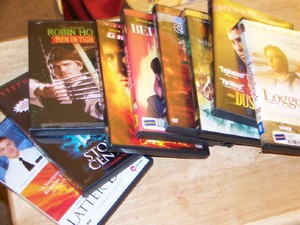
Image by giest via Flickr
Pax wrote an excellent post about the tension between Liberation and Escapism on his blog yesterday. I highly recommend it. One of the things that he talks about is the tendency for some Pagans to get so focused on the mystical and magical aspects of the Pagan traditions and tend to remain rooted in reality as well. Pax shares his own past experiences along those lines:
Even though I could see and perceive and experience the many ways in which the practice of my spirituality and faith as a Witch were leading me to greater personal strength and a deeper understanding of myself and a healthier relationship with the world around me… at the same time I was not dealing with the mundane issues at work in my life, like dissatisfaction with work and living in a bad housing situation and so many of the other planes of stability as Thorn has labeled them in her writing and teaching…. so even as I pursued the Liberation of my self and spirit, I was also using that pursuit as an Escape rather than confronting those things that I was seeking escape from!
I offered my own thoughts on the matter with the following comment:
Excellent points, Pax. I’d add that I strongly believe that an essential part of making sure my spirituality is rooted in reality is making sure that my spirituality manifests itself in my everyday reality. I’m reminded of closing of my own coven’s ritual, where we affirm that we have walked with the Divine and now seek to carry the Divine blessings we have received into the world with us.
To me, that’s a very practical thing. Did the ritual increase my sense of Oneness with everyone and the interconnectedness of all of us? Then I’m going to be looking for opportunities to build and strengthen relationship with others. Did the ritual leave me with a sense of greater perspective and inner strength? Then I’m going to look for those areas in my life that are challenging to me and those obstacles with a fresh eye, looking for how I can overcome or change them.
For those interested, the quote I’m referencing from the ritual my coven uses is as follows:
We have walked with the Stars, Sun, and Moon. Together we now bring Love, Power, and Balance to our Earth Home.
The more I think about Pax’s post and my response, the more I’m reminded of one of my own criticisms of certain streams of Pagan thought. I feel strongly that far too often, Pagans tend to make too much out of the distinction between the “spiritual,” the “magical,” and the so-called “mundane.” In reality, there is only one reality, which is multi-faceted, tightly interrelated, and tightly interdependent. And I think it’s that failure to see that the “spiritual,” “magical,” and “mundane” all inhabit the same space that often leads to the escapism issues Pax is talking about.
Of course, I think a related issue is the tendency of some to seek “spiritual experiences” as an end in themselves. Don’t get me wrong, I love spiritual experiences as much as the next person, and I have my fair share. I channel a goddess on a semi-regular basis, participate in monthly rituals, and am even attending a seance tonight, where this is a better-than-average chance that I will receive at least one message to give to at least one person.
But the nature of the universe demands that such experience spill over into all of that reality in some way. Each legitimate spiritual experience by it’s very nature should manifest itself in my life and the lives of others around me in some tangible, practical way. And if that’s not happening, it behooves me to ask why it’s not happening, and why I’m having or seeking out those experiences if nothing’s ever coming from it.




![Reblog this post [with Zemanta]](http://img.zemanta.com/reblog_e.png?x-id=ee9b8c30-7436-4e0f-a043-aef65e833aaf)


